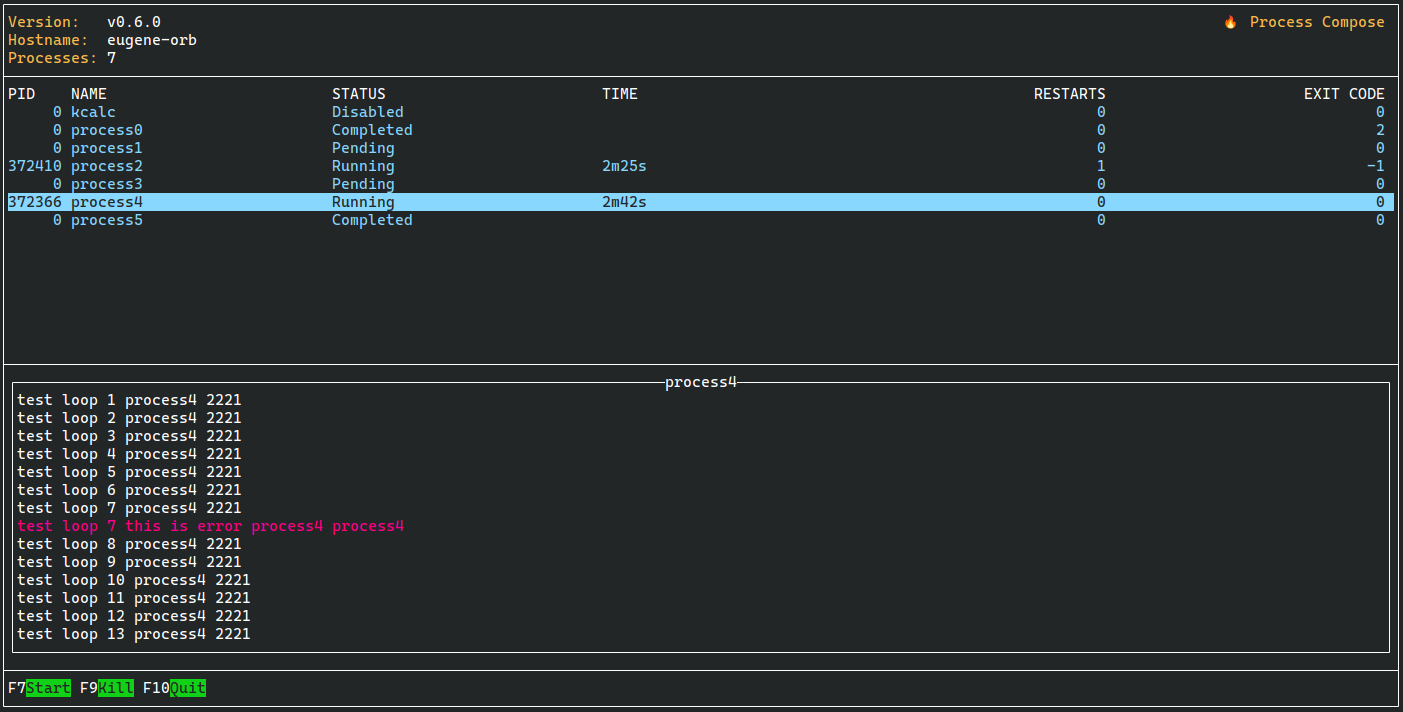| .github/workflows | ||
| examples | ||
| fixtures | ||
| imgs | ||
| src | ||
| .editorconfig | ||
| .gitignore | ||
| go.mod | ||
| go.sum | ||
| LICENSE | ||
| Makefile | ||
| process-compose-win.yaml | ||
| process-compose.yaml | ||
| README.md | ||
| test_loop.bash | ||
| test_loop.ps1 | ||
Process Compose
Process Compose is like docker-compose, but for orchestrating a suite of processes, not containers.
Why? Because sometimes you just don't want to deal with docker files, volume definitions, networks and docker registries.
Main use cases would be:
- Processes execution (in parallel or serially)
- Defining processes dependencies and order
- Defining recovery policies (restart
on-failure,always,no). Manual recovery is also supported. - Declaring processes arguments
- Declaring processes environment variables
It is heavily inspired by docker-compose, but without the need for containers. The configuration syntax tries to follow the docker-compose specifications, with a few minor additions and lots of subtractions.

Quick Start
Imaginary system diagram:
process-compose.yaml definitions for the system above:
version: "0.5"
environment:
- 'GLOBAL_ENV_VAR=1'
log_location: /path/to/combined/output/logfile.log
log_level: debug
processes:
Manager:
command: "/path/to/manager"
availability:
restart: "always"
depends_on:
ClientA:
condition: process_started
ClientB:
condition: process_started
ClientA:
command: "/path/to/ClientA"
availability:
restart: "always"
depends_on:
Server_1A:
condition: process_started
Server_2A:
condition: process_started
environment:
- 'LOCAL_ENV_VAR=1'
ClientB:
command: "/path/to/ClientB -some -arg"
availability:
restart: "always"
depends_on:
Server_1B:
condition: process_started
Server_2B:
condition: process_started
environment:
- 'LOCAL_ENV_VAR=2'
Server_1A:
command: "/path/to/Server_1A"
availability:
restart: "always"
Server_2A:
command: "/path/to/Server_2A"
availability:
restart: "always"
Server_1B:
command: "/path/to/Server_1B"
availability:
restart: "always"
Server_2B:
command: "/path/to/Server_2B"
availability:
restart: "always"
Finally, run process-compose in the process-compose.yaml directory. Or give it a direct path:
process-compose -f /path/to/process-compose.yaml
Installation
- Go to the releases, download the package for your OS, and copy the binary to somewhere on your PATH.
Documentation
- See examples of workflows for best practices
- See below
List of Features and Planned Features
✅ Mostly implemented
❌ Implementation not started (Your feedback and ⭐ will motivate further development 😃)
✅ Launcher
✅ Parallel
process1:
command: "sleep 3"
process2:
command: "sleep 3"
✅ Serial
process1:
command: "sleep 3"
depends_on:
process2:
condition: process_completed_successfully # or "process_completed" if you don't care about errors
process2:
command: "sleep 3"
depends_on:
process3:
condition: process_completed_successfully # or "process_completed" if you don't care about errors
❌ Instance Number
✅ Define process dependencies
process2:
depends_on:
process2:
condition: process_completed_successfully # or "process_started" (default)
process3:
condition: process_completed_successfully
✅ Output Handling
✅ Show process name
✅ Different colors per process
✅ StdErr is printed in Red

❌ Silence specific processes
✅ TUI (Terminal User Interface)
✅ Review processes status
✅ Start processes (only completed or disabled)
✅ Stop processes
✅ Review logs
TUI is the default run mode, but it's possible to disable it:
./process-compose -t=false
Control the UI log buffer size:
log_level: info
log_length: 1200 #default: 1000
processes:
process2:
command: "ls -R /"
Note: Using a too large buffer will put a significant penalty on your CPU.
✅ Logger
✅ Per Process Log Collection
process2:
log_location: ./pc.process2.log #if undefined or empty no logs will be saved
✅ Capture StdOut output
✅ Capture StdErr output
✅ Merge into a single file
processes:
process2:
command: "chmod 666 /path/to/file"
environment:
- 'ABC=42'
log_location: ./pc.global.log #if undefined or empty no logs will be saved (if also not defined per process)
❌ Silence specific processes
✅ Process compose console log level
log_level: info # other options: "trace", "debug", "info", "warn", "error", "fatal", "panic"
processes:
process2:
command: "chmod 666 /path/to/file"
This setting controls the process-compose log level. The processes log level should be defined inside the process. It is recommended to support its definition with an environment variable that can be defined in process-compose.yaml
❌ Health Checks
❌ Is Alive
❌ Is Ready
❌ Auto Restart if not healthy
✅ Auto Restart on exit
process2:
availability:
restart: on-failure # other options: "always", "no" (default)
backoff_seconds: 2 # default: 1
max_restarts: 5 # default: 0 (unlimited)
✅ Environment Variables
✅ Per Process
process2:
environment:
- 'I_AM_LOCAL_EV=42'
✅ Global
processes:
process2:
command: "chmod 666 /path/to/file"
environment:
- 'I_AM_LOCAL_EV=42'
environment:
- 'I_AM_GLOBAL_EV=42'
Default environment variables:
PC_PROC_NAME - Defines the process name as defined in the process-compose.yaml file.
PC_REPLICA_NUM - Defines the process replica number. Useful for port collision avoidance for processes with multiple replicas.
✅ REST API
A convenient Swagger API is provided: http://localhost:8080/swagger/index.html

✅ Configuration
✅ Support .env file
✅ Override ${var} and $var from environment variables or .env values
❌ Merge 2 or more configuration files with override values
✅ Specify which configuration files to use
process-compose -f "path/to/process-compose-file.yaml"
✅ Auto discover configuration files
The following discovery order is used: compose.yml, compose.yaml, process-compose.yml, process-compose.yaml. If multiple files are present the first one will be used.
✅ Multi-platform
✅ Linux
The default backend is bash. You can define a different backend with a SHELL environment variable.
✅ Windows
The default backend is cmd. You can define a different backend with a SHELL environment variable.
process1:
command: "python -c print(str(40+2))"
#note that the same command for bash/zsh would look like: "python -c 'print(str(40+2))'"
Using powershell backend had some funky behaviour (like missing command1 && command2 functionality in older versions). If you need to run powershell scripts, use the following syntax:
process2:
command: "powershell.exe ./test.ps1 arg1 arg2 argN"




